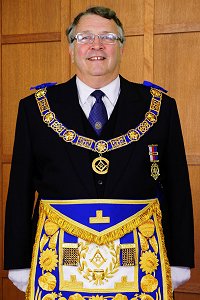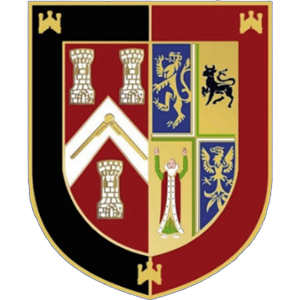Provincial History

A Brief History Of Freemasonry In Devonshire
From an original text by W.Bro. Ron Chudley, edited by W.Bro. David Purnell PAGDC for use on this web site.
In 1775 Devonshire was the 25th Province to be warranted by the then Grand Lodge of England. It is of interest to note that this relatively late recognition of the province was in contradiction with the fact that within Devonshire are some of the oldest Masonic Lodges in the world, most notably St. John the Baptist Lodge, No. 39, which has continuously worked in Exeter since 1732 – some 43 years before the first Provincial Grand Master was appointed. The warrant for the Province was given under the authorisation of the Moderns Grand Lodge, 38 years before The United Grand Lodge of England was formed, when the Moderns and the Antients united under one banner.
The request for a Provincial Grand Master for Devonshire was made by members of the Union Lodge, which was started in 1766 with an exclusive and influential membership limited to 24. After seeking the approval of the three other Lodges in Exeter – St Georges No 112, The Ship Masters, and (belatedly) St. John the Baptist No. 39 – the Grand Master in London was petitioned. Eventually, on 18th December 1775 Sir Charles Bampfylde, 5th Baronet of Poltimore, of the Union Lodge, was installed as the first Provincial Grand Master. Sir Charles’s uncle, the Master of the Union Lodge, John Codrington was installed as Deputy Provincial Grand Master and was responsible for organising the Province whilst Sir Charles, who was also the Whig Member of Parliament for Exeter, was away in London.



The members of St. John the Baptist Lodge No. 39, appeared to have had a grievance with the way in which the Provincial Grand Master was appointed and the dominance of members of Union Lodge in the Provincial hierarchy and wrote to Grand Lodge for confirmation of the appointment. Lodges in Tiverton and Topsham also made similar requests and each received the confirmation that Sir Charles Bampfylde had been appointed as PGM. Of the 22 known ‘Moderns’ lodges in operation when the Province was established six are still in existence and of the ‘Antient’ lodges, two are still in operation. There are now 135 operational lodges in the Province.
Sir Charles Bampfylde was only 15 years old when he became a freemason, probably one of the youngest initiates ever. He became Provincial Grand Master at the age of 22 and he presided in that position for 44 years, longer than any other PGM. He resigned in 1819. In 1823 Sir Charles was shot dead by Joseph Morland, against whom Sir Charles’s servants had been bringing a criminal prosecution for assault.
In the years following the warranting of the Province in 1775 freemasonry seems to have taken a decline in Devonshire. Several lodges closed and charity returns to Grand Lodge were either minimal or absent. However, a reversal of fortunes from about 1795 lead to the formation of several new Lodges that are still active today and Lodge records began to show that visiting Brethren were more frequent.
Sir Charles Bampfylde was succeeded 1819 by Hugh Fortescue, Viscount Ebrington, later the 2nd Earl of Fortescue. He was installed by the Provincial Grand Master of Somerset, Colonel C.K.K. Tynte MP, and immediately set about reinvigorating the Province. He initiated a committee to draw up by-laws for the Province, ordered an inventory to be made of Provincial Lodge possessions and instituted a committee to investigate applications for relief. Under his leadership the Devon Provincial Educational Fund and the Devon Provincial Fund of Masonic Benevolence were initiated. Upon his death in 1861 the Fortescue Fund was set up as a memorial to his charitable works.
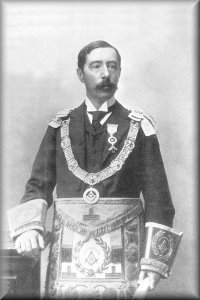


The oldest Lodge in Devonshire, Saint John The Baptist No. 39 was awarded its jewel to celebrate the centenary of its founding, in 1832 but it was not until 1864, and only with the assistance of the then deputy Provincial Grand Master Reverend John Huyshe, that it was actually presented. This delay was probably the result of an outbreak of Cholera in Exeter in 1832 and a suspension of meetings of the Lodge for eighteen months over this infectious period during which time the awarding of the centenary jewel was obviously forgotten about and not resurrected until much later.
The Reverend John Huyshe succeeded Viscount Ebrington as Provincial Grand Master and was installed in 1866. John Huyshe had already been Provincial Grand Master of Mark Master Masons and also Grand Superintendent of the Province for the Holy Royal Arch so was well knowledgeable about the governance of freemasonry. His absorbing ambition was to enhance the respectability of freemasonry by encouraging Lodges to find their own premises away from the inns and taverns where they frequently met and to encourage members to return to their families after their meetings.
Lodge of Fortitude No. 105 and Lodge of Friendship No 202 had already opened a Masonic hall in Plymouth and Provincial Grand Lodge formally used this in April 1823. However, the use of the building by freemasons was short lived and in only a few years it had been sold as the financial support to maintain it could not be found (the hall was eventually destroyed during the wartime blitz in 1941).
St. George’s Lodge No. 112 first suggested the idea of a Masonic Hall in Exeter in 1823 but it was not until 1841 that John Huyshe’s dream of ‘rescue’ from the inns and taverns was realised when the Exeter Lodges moved to Tuckers Hall in Fore Street and there they remained for several years. Over the next 20 or so years other Lodges in Devonshire moved to their own premises; for example St. John’s Lodge, Torquay, followed suit in 1857 and in 1866 the Lodge of Fortitude No. 105 moved into the Huyshe Masonic temple in Stoke, Plymouth. In addition, over this same period more than a dozen new Lodges were formed and the membership grew from 500 to more than 1500 in Devonshire alone.
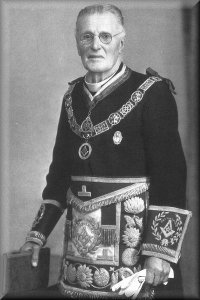
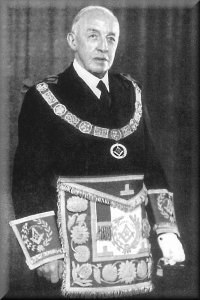
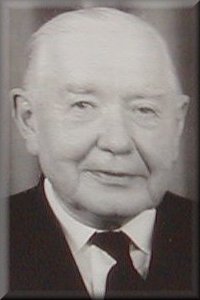
In Exeter pressure to move from the shared accommodation in Tuckers Hall was sufficient that new premises in Gandy Street were acquired and dedicated by John Huyshe on St Georges’s Day 1877 The St. John the Baptist Lodge held their first meeting there three days later being quickly followed by other Exeter based lodges. Modification to the building led to the discovery of fine oak screens dating to the 14th and 15th century together with a very fine entrance.
Suffering poor health John Huyshe resigned as Provincial Grand Master in 1879, and died, aged 80, the following year. A contemporary remembers him as “The history of John Huyshe is the history of all that has been good and progressive in masonry for the past half century”.
Hugh, Viscount Ebrington, 4th Earl Fortescue succeeded John Huyshe. Initiated into Loyal Lodge No. 251, in Barnstaple, he served as Master in 1879 and joined St. George’s Lodge No. 112 in the same year. He resigned as Provincial Grand Master in 1896 when he installed his successor, Hugh Stafford, Baron Northcote of Exeter.
Hugh Stafford was initiated into St. John The Baptist Lodge No. 39 where he served as Master in 1894. He also joined St. George’s Lodge in 1893. At the time of his appointment as Provincial Grand Master in the Craft degree he was already Provincial Grand Master of the Mark degree. He was MP for Exeter from 1880 to 1899 and in 1900 he was elevated to the peerage and appointed Governor of Bombay. During his absence abroad he left the running of the Province to his deputy Major G.C. Davie who remained in charge whilst Lord Northcote was in India. Following his term in India, he was appointed Governor of the Australian Commonwealth and feeling that he could no longer serve the province adequately, whilst absent for a further five years, he resigned in 1903. Lord Northcote was the third and last governor General of Australia.

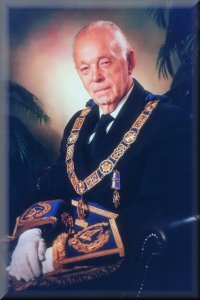
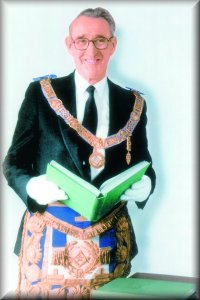
In 1904 Major George Christopher Davie was installed as Provincial Grand master. He had been initiated into Loyal Lodge No. 251, in Barnstaple, in 1882. He was a member of Devon County Council and had served with the North Devon Yeomanry Cavalry. At the time of his installation there were 62 lodges in the Province and 4691 subscribing members. Major Davie died in office in September 1928 and was mourned by the province as having been a much-loved Mason who exerted a ‘beneficial rule’.
Missing documentary proof meant that the centenary of Freemasonry in Devonshire could not be celebrated until 1921 though it was acknowledged that 1875 would have been the correct date. The event was presided over by the Provincial Grand Master, Major G.C. Davie, and celebrated by more than 700 Brethren from all the 79 Lodges in Devonshire, in full regalia, assembled in Exeter Cathedral. The Provincial Grand Chaplain, Worshipful Brother the Reverend W.F. Surtees – later to become Bishop of Crediton and also Provincial Grand Master from 1938 to 1955 – gave the sermon.
Sir Henry Lopes Bt. was installed as Provincial Grand Master in 1929. He was a Barrister at Law and had been MP for Grantham from 1892 to 1900. He was also Deputy Lieutenant and High Sheriff of Devonshire. He had married the daughter of the 4th Earl of Mount Edgcumbe who was Provincial Grand Master of Cornwall and later, Deputy Grand Master of England. In 1938 he became Lord Roborough of Maristow and died in the same year.
In 1933, when Sir Henry Lopes was Provincial Grand Master, some 2000 Masons in full regalia paraded through the streets of Exeter to the Cathedral where a special service was held to mark the 800th anniversary of the church. Bishop Surtees again preached the sermon. At this ceremony one of the Assistant Directors of Ceremonies was W.Bro. W.A. Kneel, later also to become Provincial Grand Master (1970-1984). This was the last occasion, until the 225th celebrations in June 2000, that Freemasons were seen in public, in their regalia, in the Province.
William Frederick Surtees, who had been initiated into Earl of Mount Edgcumbe Lodge No 3924 in 1920, was installed as Provincial Grand Master for Devonshire in 1938. Educated at King’s College Cambridge he served the Church all his life as rector of Sampford Courtenay from 1907-1912, Vicar of St Simon’s, Plymouth (1912-1925), Archdeacon of Exeter (1925-1930) and Lord Bishop of Crediton for the next 25 years. He had been appointed Provincial Grand Chaplain in 1920 and Grand Lodge Chaplain in 1933. Failing health forced him reluctantly to resign in 1955 having steered the Province through the difficult times of the Second World War and the subsequent rebuilding years. A memorial fund raised £6000 for the purchase of a new choir stalls for the nave in Exeter Cathedral.
His successor was the Assistant Provincial Grand Master, Sir Arthur Conrad Reed, Master of St. George’s Lodge No. 112, who was installed as Provincial Grand Master in 1955. He was educated at Queen’s College, Taunton and was MP for Exeter from 1931 to 1945 as well as being a member of the City Council and a magistrate. He was knighted in 1945 and Chairman of Directors of Reed, Smith Ltd. as well as other companies. He died in office in 1961.
Cyril Henry Crews who was installed as Provincial Grand Master at Torquay, in 1961 succeeded Sir Arthur Reed. He had been initiated into the Sir Joshua Reynolds Lodge No. 4782, meeting in his hometown of Plympton and where he was Master in 1937. Under his guidance the Province continued to flourish as he emphasised the importance of care when choosing candidates and of observing Masonic etiquette. He died in office in 1970 when his successor described him as “a wonderful man”.
One of the most endearing and active Provincial Grand Masters was William Alexander Kneel who was installed in June 1970 having been in Freemasonry for 50 years. He was initiated into St John the Baptist Lodge No. 39 but was also a founder member of two other Lodges. Charity was his major interest and in 1962 he was the Provincial Treasurer for the Girls Festival, which raised £167,455 from Devonshire out of a total of £310,723 raised nationally. In 1977 he presided over the Boy’s Festival and from the national total raised of £819,144 Devonshire contributed £649,393.
Right Worshipful Brother Kneel’s ambition was to provide a home for the elderly and lonely Freemasons and their dependents. An appeal was launched in the Province and in 1983 land was acquired in Exeter on which to build the home. This lead to the development of Cadogan Court, a beautifully appointed residential home where Freemasons and their dependents can live out their lives in peace and tranquillity. William Alexander Kneel resigned and died in 1984.
Archibald John Huxtable was initiated into Loyal Lodge No. 251 in 1943, serving as Master in 1960. He served as Provincial Grand Master from 1984 to 1992.
Kenneth John Alford was initiated into the Sun Lodge No 106 in 1958 where he served as Master in 1970. He was Provincial Grand Master from 1992 until his death in 1994.
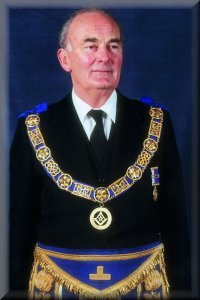
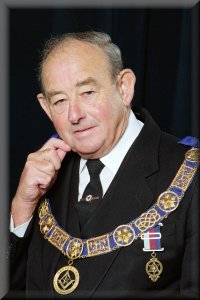
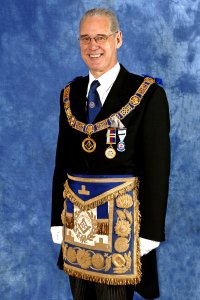
Edward Joseph Holman initiated into Pleiades Lodge No. 710 in 1959 where he served as Master in 1970. He was installed as Provincial Grand Master in 1994 and served the Province until his resignation in 1999.
The 15th Provincial Grand Master was Robin O. Osborn. He was initiated into the Benevolent Lodge No. 303 in 1957 and served as Master in 1970. He was installed as leader of the Province in 1999 and retired from office on 2nd June 2007. He was succeeded by Rt.W.Bro. Michael T. Penny who served the office until the end of 2012. He was succeeded Rt.W.Bro. Ian Kingsbury who served until April 2023 who was then succeeded by our current Provincial Grand Master Rt.W.Bro. Nicholas A Ball
